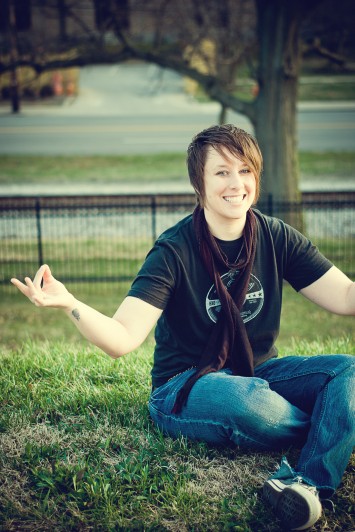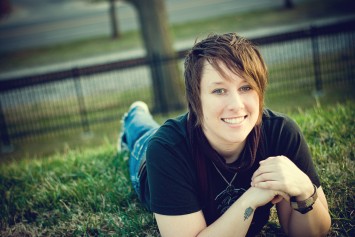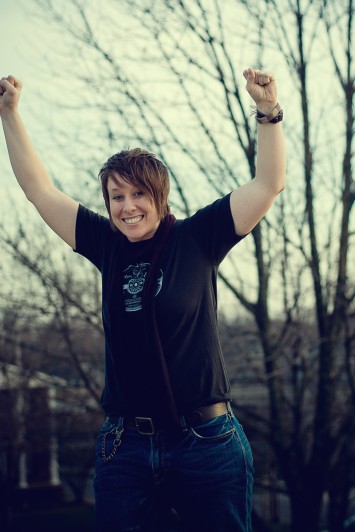social bookmarking tools:
 |
|
| Available RSS Feeds |
|---|
 - Top Picks - Top Picks |
 - Today's Music - Today's Music |
 - Editor's Blog - Editor's Blog
|
 - Articles - Articles
|
Add Louisville Music News' RSS Feed to Your Yahoo!
|

Audrey Cecil Gets Organic
Audrey Cecil turns into a wide-eyed little girl when shediscusses music – hers or the music of the artists she admires.The singer-songwriter gushes and excitedly when she talks aboutperforming, recording and writing.
"I forget this about her a lot of times because Itake it for granted," said her collaborator and bass player RobGable, with an admiring chuckle. "She is very intelligent andwell-spoken, but then when she finds a new artist or a song she justloves, she has that kind of wide-eyed, this-is-the-coolest-thing-everresponse to it."
Having recently recorded and released her first soloalbum, Cecil has also developed a keen, wide-eyed appreciation for anorganic approach to recording music.
"I feel like people who put out some reallyorganic stuff are trailblazers," she said. "People whouse this early fashion of recording – they're going backto what's really real."
When she and her band went to work on her self-titledrelease in conjunction with local label One Horse Records, the goalwas to record 12 songs as honestly as possible – no pitchcorrection, no digital instruments, minimal compression.
Cecil used Neko Case as an example of a trailblazer inthis kind of recording – she said Case was quoted ascriticizing modern producers for taking out singers' breaths inrecordings, which tends to de-humanize the finished product.
"You think a singer sings a whole song and doesn'tbreathe?" Cecil said. "I'm not saying I wouldn't[mimics turning away from a microphone) to take a breath, but for themost part we left it all in."
Cecil points out that One Horse Records' motto is"Free the music." Founder Joe Brown explains that theorganic approach Cecil gets so giddy about is the basis for thephilosophy.

"We are trying to search out and presentsinger-songwriters artists in our area that we just feel like havesomething to offer lyrically, melodically, harmonically and allthat," Brown said. "We want to present them in a way thatdoesn't get in the way of the music."
As for how "Free the music" fits in with hisrecording practices – Brown produces the One Horse releases –he said, "Obviously, some production goes on, but when you seethese people play live, they sound pretty much the way they sound [onthe recording]."
One Horse is an upstart label that is rooted in a localadvertising agency, Vest Advertising; Brown, an employee, approachedowner Larry Vest about starting a label and Vest, who is a musicianin his own right, agreed. The agency has its own recording studio, soBrown records and produces One Horse artists like Cecil when thestudio isn't in use by the agency. And so, Cecil'seponymous debut was recorded over the course of a year on weekendsand evenings whenever everyone was available.
The result is a, well, organically gorgeous recording ofa singer-songwriter and her musical team at the top of their craft,with vocal harmonies, pristine instrumental performances and honest,emotional storytelling. Not bad for a self-confessed "latebloomer" who only started playing guitar while in college.
A QUICK STUDY
Cecil didn't grow up with a lot of music in herlife, and said she began to take notice of music while in her middleschool years.

"I have ADD [Attention Deficit Disorder],for real, and I really couldn't sit and do anything for anyamount of time," she said. "If I did, I would drive mymom insane. But I remember locking myself in my bedroom with apuzzle; I would never do the puzzle, but I would wait for SherylCrowe's Tuesday Night Music Club to come on the radioand I would tape it. I remember being totally enamored by hervoice."
She later began listening to Rumours by FleetwoodMac and singer-songwriters from the 1960s and '70s.
"I got made fun of a lot," she said. "Ithink the harmonies are what drew me in, along with LindsayBuckingham's style of guitar playing. When I go back and listento Fleetwood Mac now, though, I don't hear that in my writing.I'm a folk singer. Maybe that was the best of what wasavailable to me at that point."
She said she began to "immerse" herself inmusic during her college years in the early 2000s. "I learnedhow to play every Indigo Girls song that exists, every Sheryl Crowesong I could figure out. I just learned to play cover songs, and tobe honest I just focused on guitar playing for a good five years.That's what I was to myself – a guitar player; I wasn'tnecessarily a singer at all."
Her first experience performing was in an acoustic duocalled A-Squared, but it was when she met Gable that she began toconcentrate on writing songs. He had a backlog of originals, andtogether they formed a collective called Two Cent Penny, releasingone album of material consisting of a mix of Gable originals andCecil originals, plus one cover tune.
Gable is currently playing bass in Cecil's band,and was heavily involved in recording the album.
"He and I are like kindred spirits," Cecilsaid. "I actually pulled him into a semi-producer role on therecord. I know Rob will tell me when I can do better, and he willalso tell me when I can't do any better, when it's goodenough to lay it down. He's a comfort to me to bring in withanother set of ears, because he really does have a good ear."
"I think one of the things that helps is wegenuinely like each other," Gable said, "and have beenclose friends outside of music. We can throw things out there, and ifit's not good, that person is going to take the criticism forwhat it is and we'll work until it is good."
A NEW PHASE
Two Cent Penny took a creative step forward when Cecilrekindled an old friendship with a local singer-songwriter namedAmanda Lucas.
"We wanted to expand a little bit – wewanted to grow into trio because we both loved three-part harmonies,"Cecil said. "I had known Amanda since I was kid and I ranacross her on MySpace."
Drummer Richard Hendrix, who had played on the Two CentPenny album as a guest musician, joined the new ensemble to create anofficial quartet, and keyboard player Leah Sproul has recently comeon board as well.
But as the group began to play more and more, Cecil saidshe was asked if she and Lucas would consider playing as a duo. Sothey did, and found another life as an acoustic duo that wouldquickly find opportunities playing numerous shows, ranging from smallcoffeehouses to festivals – they both have full-time jobs, butnow play 100-150 shows per year. They opened for Girly Man recently,and last year played the National Women in the Arts Festival inLansing, Mich.
Cecil noted that both suffered a bit of stage fright asthey prepared to perform in front of literally thousands of people inthis outdoor setting. Lucas was tapped to sing the first song intheir set, and she tried to coax Cecil into changing the set list asthey faced the audience.
"I just started playing the first song, so therewas nothing she could do but sing," Cecil said. It turned outOK, Lucas shone in her performance, and the set went off without ahitch. Just like all their other shows.
"Audreyand I have a chemistry on stage that I've never had with anyoneelse," Lucas said. "There's definitely a level oftrust that goes into performing with people and her and I have builtthat trust. I enjoy collaborating with Audrey becomes she brings alot of different elements to my songs. She adds great harmonies andunique guitar parts."
"She's a pop singer and I'm a folkwriter," Cecil said of Lucas, "but it works. I don'tknow how it works, but it works. She's able to take my songsand spice them up in a way I'm not able to, and I'm ableto take her songs and spice them up with more intricate guitar partsand harmonies."
Lucas released a solo album in 2008, and Cecil said thegroup has evolved into kind of a rotating collective of artists; eachone helps the other in a team-oriented effort.
"For a good year we were her support band,"Cecil said. "That was understood and we were happy to do it.Now it's sort of my turn. There is a good understanding ofcollaboration that works for us."
But the story behind Cecil's solo album is aninteresting revelation of the importance of being in the right placeat the right time.
MEET AUDREY CECIL
"It literally fell into my lap," Cecil saidof her chance at recording the album. "Rob called me up one dayand said, ‘I'm going to this recording workshop.' Iwent because I was looking into doing some home recording."
The recording workshop was being held at VestAdvertising and hosted by Brown.
"Unbeknownst to me, this advertising agency alsohad a record label," Cecil said. "I learned aboutrecording, different kinds of microphones, technical things, and weall sang a song.
"At the end of the session, [Brown] came up andasked if I had any other songs. He asked me to come back and do somedemos for him. I did, and the next day I got an e-mail with an offerfor a recording deal."
Brown remembers it like this: "Cody Vest (who isalso involved in the agency and label) and I were standing in thecontrol room, and she was playing one of her tunes. It was the veryfirst one on the CD if I'm not mistaken [a track called "SongFrom Me"]. Cody said, ‘She's the real deal.'I said, ‘Yeah, I think you're right.'
"I really liked the lyrics; that's the way Iremember it. She also had a great guitar style that we wanted to comethrough on the recording."
"Audrey has a very natural and intuitive sense ofhow to tease very ounce of life from the simplest of chords,"Gable wrote, interestingly enough, in a Facebook post on One HorseRecords' page. "One of those things that you just can'tteach. You either have it or you don't. An ability that I amrepeatedly impressed by and envious of."
"I never planned this and never thought I could,but when it's offered to you, you don't say no,"Cecil said. "It opened up another world that I didn'tknow was there."
The biggest eye-opener was the recording process itself,something Cecil and her cohorts took to immediately. Being under thetutelage of a seasoned recording engineer (Brown formerly owned RadioJoe's) certainly helped their learning curve.
"The recording process was so enlightening forme," Cecil said. "Wow. I'm really proud [of thealbum]. I get so overwhelmed and immersed in the music sometimes, somuch that you almost don't have time to be proud of yourself. Iwas lucky enough to fall into a situation where somebody wanted torecord 12 of my songs in a great studio."
One of the aspects of the album about which she is mostproud is that she was able to utilize her friends; in many if notmost cases such as these, the producer wants to bring in his or herown hand-selected studio musicians. Cecil wanted the comfort andchemistry of her band, and got to run with that with Brown'sblessing.
And as noted before, she wanted it to be organic –this also was Brown's vision, which made the process evenbetter. "We barely used a click track," Cecil said. "Whenit comes to music, I'm a purist. Some people might call me asnob, but I'm into the integrity and things being real.
"I think there are very few people who really fallin line with One Horse's philosophy. Everything is so raw. ButI think I'm one of the few people who fit with that. Mostmusicians would think they're crazy, but it worked for us."
Cecil describes her time in the studio with hertrademark wide-eyed, childlike enthusiasm. Speaking about someharmony arrangements she and Sproul worked on for the track "Hand,"she described a scene in which they hit the mark and were in a mutualstate of excitement over the results. It was well after midnight andeveryone was tired, but it was a mission-accomplished moment thatpaid off a lot of effort and work.
"I think Joe wanted to kill us, but we were justgiddy," Cecil said.
Brown gushes similarly about the results. He names "SongFrom Me," the one that hooked him at that fortuitous recordingworkshop, as his favorite.
"It is so winsome, so personal," he said."Her delivery is so transparent, so vulnerable. She just kindof opens up herself and there she is, right in front of you in songand lyric. I think that's what appealed to us right from thestart, and hopefully that comes through on the album."
Lucas also names "Song FromMe" as her favorite: "Audrey'ssongs can be interpreted in many different ways, depending on thelistener. As a person who loves and writes pop songs, I gravitatetowards songs that are very cut and dry. When Audrey introduces it atour shows, she always says that it's her only love song andthat is why I like it. I like songs that I can relate to and I thinkeveryone can relate to a love song."
Gable supportedthe notion of Cecil's authenticity: "She isone of coolest, most down-to-earth people I could ever hope to meet."
So we can expect her to continue following in thefootsteps of her organic heroes like Brandi Carlile, KathleenEdwards, Patty Griffin and Paul Simon. The plan is to take the musicout to as many people as possible who will share the enthusiasm,through the full band and the Cecil-Lucas duo.
"The push right now is to get this record out towhoever wants to hear it and put together as many shows as we can,"Cecil said. "We're lucky to have little pockets of fansall around the country – that makes it easy to go somewhere andknow somebody that wants to watch you play."
The sparkle of enthusiasm again rises in her eyes.
"When you come home, you have 100 Facebookrequests for friends who came and saw you play," she continued."It's nice to know that somebody is listening and thatthey care. For the CD release show, I had well-wishers texting mefrom everywhere saying, ‘I'm thinking abut you today.'
"It's nice to just have people who care andwho think your music is good. It makes you want to keep doing it."
We can rest assured that Audrey Cecil will continuedoing just that, wide-eyed and enthusiastic, keeping it organic allthe way.
